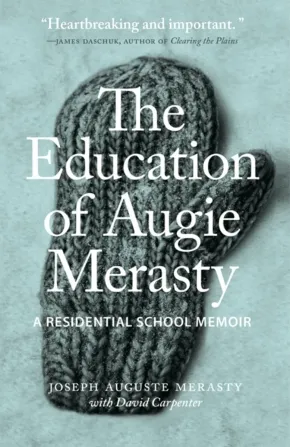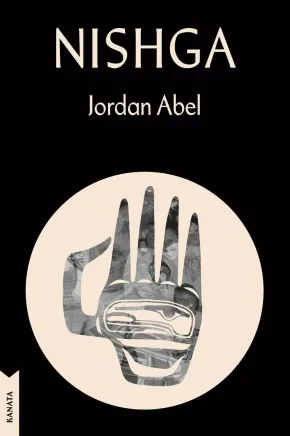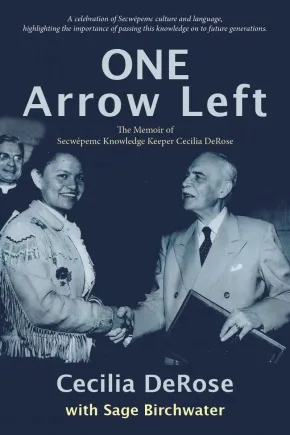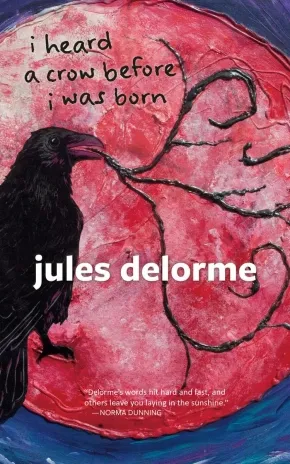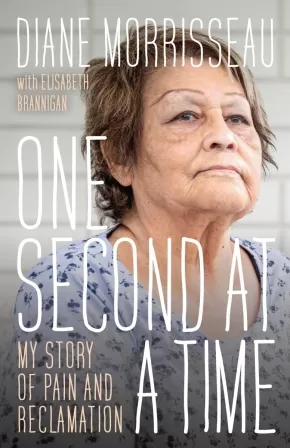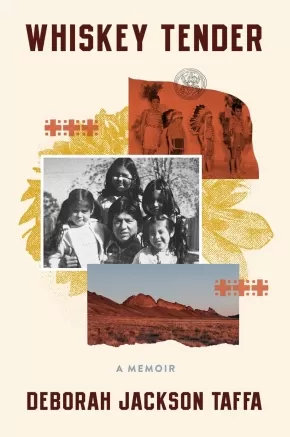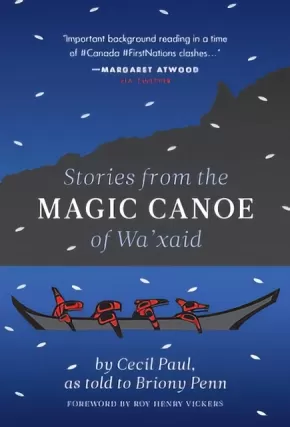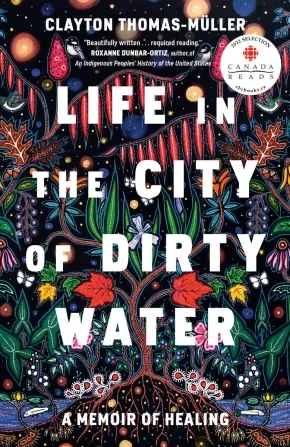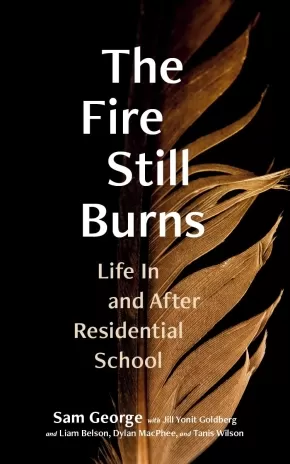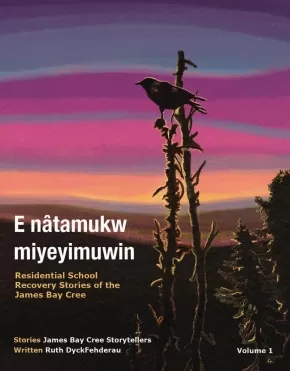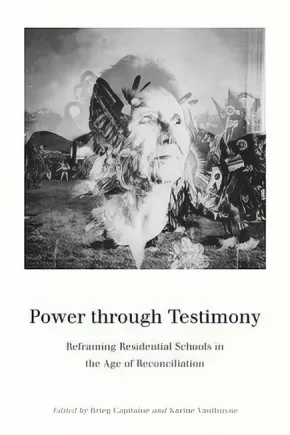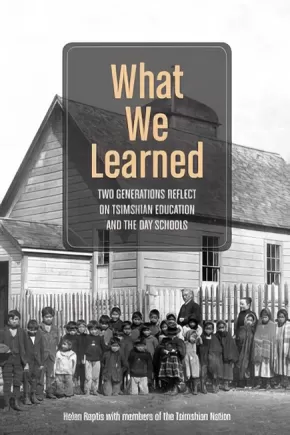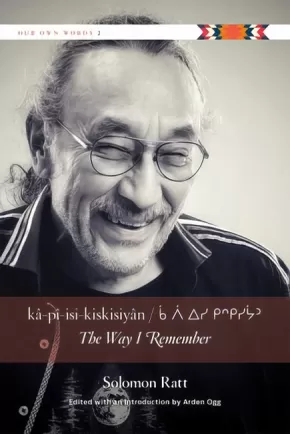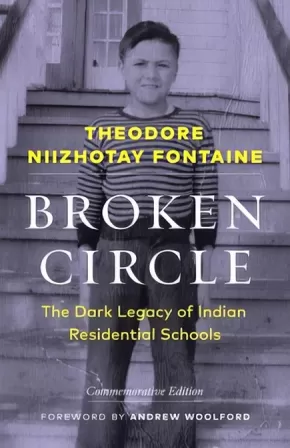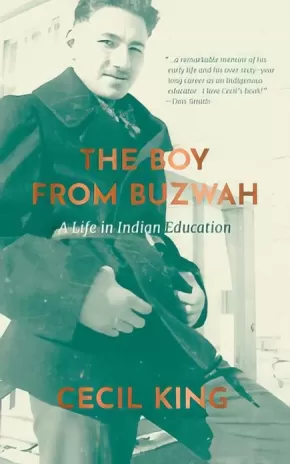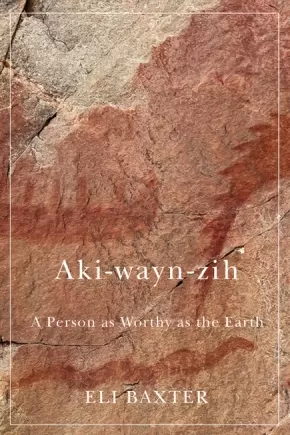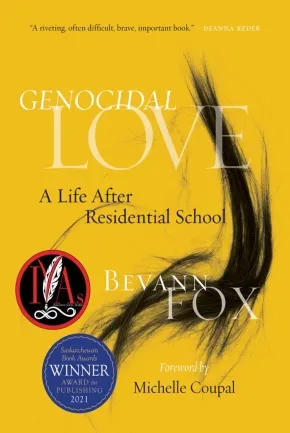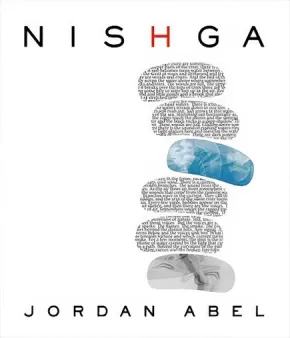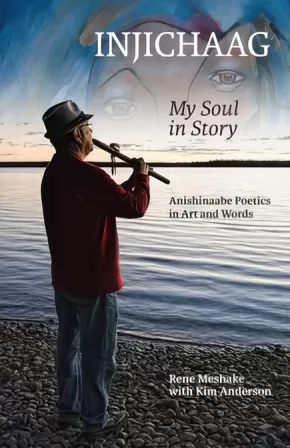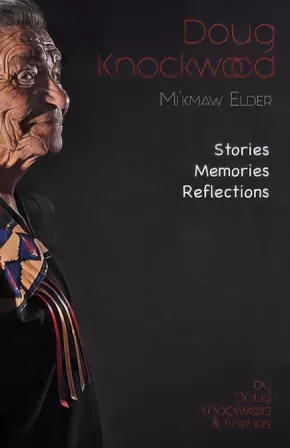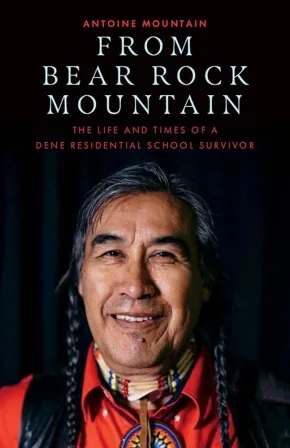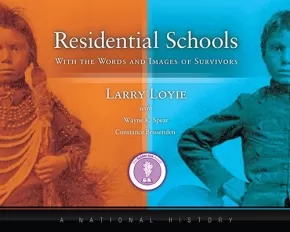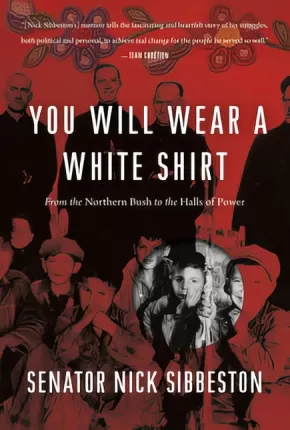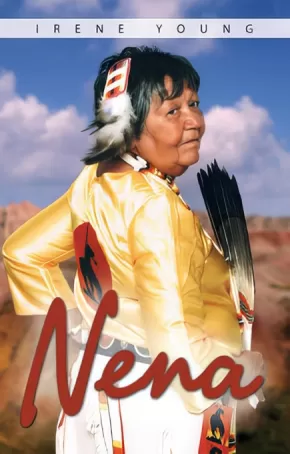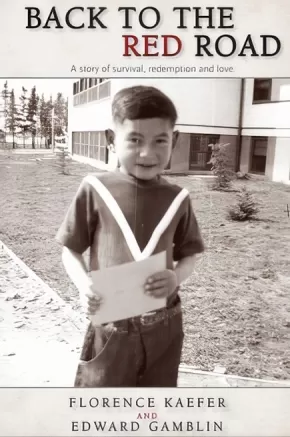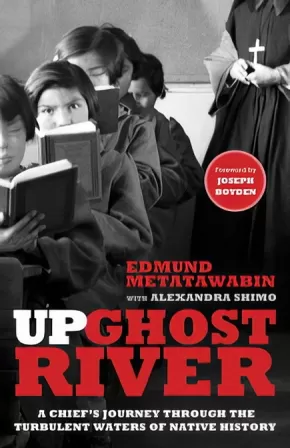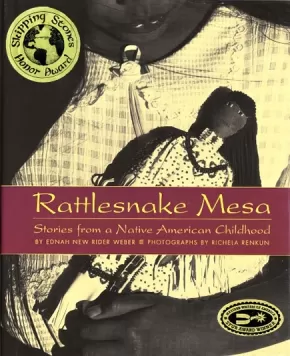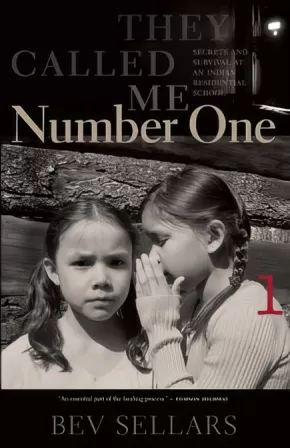Memoirs
Synopsis:
The Education of Augie Merasty offers a courageous and intimate chronicle of life in a residential school.
Now a retired fisherman and trapper, Joseph A. (Augie) Merasty was one of an estimated 150,000 First Nations, Inuit, and Metis children who were taken from their families and sent to government-funded, church-run schools, where they were subjected to a policy of "aggressive assimiliation."As Merasty recounts, these schools did more than attempt to mold children in the ways of white society. They were taught to be ashamed of their native heritage and, as he experienced, often suffered physical and sexual abuse.Even as he looks back on this painful part of his childhood, Merasty’s generous and authentic voice shines through.
Awards
- 2016 Burt Award Second Place Winner
Reviews
"At 86, Augie Merasty has been a lot of things: Father. Son. Outdoorsman. Homeless. But now he is a first-time author, and the voice of a generation of residential-school survivors.... The Education of Augie Merasty is the tale of a man not only haunted by his past, but haunted by the fundamental need to tell his own story... one of the most important titles to be published this spring." —Globe and Mail
"[Augie] wrote his memoir to show people the unbelievable atrocities suffered by so many Indigenous people and in the hope that others would come forward to tell their stories of what happened in the residential schools." —Eagle Feather News
"This book is so much bigger than its small size. It is a path to healing. We cannot change history, but we can acknowledge it, learn about it, and remember it." —Prairies North
"The Education of Augie Merasty might be a small book, but it carries a punch to it that all Canadian need to read and understand." —Rabble
"A truly extraordinary memoir by a truly extraordinary man." —Midwest Book Review
"Carpenter's introduction and afterword... allow us to come to better understand Augie's 'sometimes chaotic, sometimes heroic aftermath of his life,' as Carpenter describes his last decade. Where Augie focuses on physical scars, Carpenter's experiences with Augie illustrate the long-term impacts on his residential school experience. And with The Education of Augie Merasty, he helps Merasty--who could be any number of individuals we each pass on the street--find his voice." —Active History
"Unsettling and profound, and good." —Blacklock's Reporter
"In this book I have seen horror through eyes of a child." —James Daschuk, author of Clearing the Plains
"A story in which our entire nation has an obscure and dark complicity." —David Carpenter, co-author of The Education of Augie Merasty and author of The Gold and other books
Educator Information
The Canadian Indigenous Books for Schools list recommends this resource for Grades 9-12 English Language Arts and Social Studies.
Caution: Mature subject matter and descriptions of discrimination, sexual/physical violence, and substance abuse.
Additional Information
105 pages | 4.25" x 6.53" | Hardcover
Synopsis:
Part of the inaugural Kanata Classics list, with a new introduction by David Chariandy, NISHGA is a groundbreaking, deeply personal, and devastating autobiographical meditation that attempts to address the complicated legacies of Canada’s residential school system and contemporary Indigenous existence.
As a Nisga'a writer, Jordan Abel often finds himself in a position where he is asked to explain his relationship to Nisga'a language, Nisga'a community, and Nisga'a cultural knowledge. However, as an intergenerational survivor of residential school--both of his grandparents attended the same residential school--his relationship to his own Indigenous identity is complicated to say the least.
NISHGA explores those complications and is invested in understanding how the colonial violence originating at the Coqualeetza Indian Residential School impacted his grandparents' generation, then his father's generation, and ultimately his own. The project is rooted in a desire to illuminate the realities of intergenerational survivors of residential school, but sheds light on Indigenous experiences that may not seem to be immediately (or inherently) Indigenous.
Drawing on autobiography and a series of interconnected documents (including pieces of memoir, transcriptions of talks, and photography), NISHGA is a book about confronting difficult truths and it is about how both Indigenous and non-Indigenous peoples engage with a history of colonial violence that is quite often rendered invisible.
Reviews
“With NISHGA, Jordan Abel has reinvented the memoir, incorporating personal anecdotes, archival footage, legal documentation, photos and concrete poetry to create an unforgettable portrait of an Indigenous artist trying to find his place in a world that insists Indigeneity can only ever be the things that he is not. Abel deftly shows us the devastating impact this gate-keeping has had on those who, through no decisions of their own, have been ripped from our communities and forced to claw their way back home, or to a semblance of home, often unassisted. This is a brave, vulnerable, brilliant work that will change the face of nonfiction, as well as the conversations around what constitutes Indigenous identity. It's a work I will return to again and again.” —Alicia Elliott, author of A Mind Spread Out on the Ground
“In NISHGA, Jordan Abel puts to use the documentary impulse that has already established him as an artist of inimitable methodological flair. By way of a mixture of testimonial vignettes, recordings of academic talks, found text/art, and visual art/concrete poetry, Abel sculpts a narrative of dislocation and self-examination that pressurizes received notions of “Canada” and “history” and “art” and “literature” and “belonging” and “forgiveness.” Yes, it is a book of that magnitude, of that enormity and power. By its Afterword, NISHGA adds up to a work of personal and national reckoning that is by turns heartbreaking and scathing.” —Billy-Ray Belcourt, author of NDN Coping Mechanisms and A History of My Brief Body
"This is a heart-shattering read, and will also be a blanket for others looking for home. NISHGA is a work of absolute courage and vulnerability. I am in complete awe of the sorrow here and the bravery. Mahsi cho, Jordan.” —Richard Van Camp, author of Moccasin Square Gardens
“Jordan Abel digs deeply into the questions we should all be asking. Questions that need no explanation but ones that require us to crawl back into our bones, back into the marrow of our understanding. NISHGA is a ceremony where we need to be silent. Where we need to listen.” —Gregory Scofield, author of Witness, I Am
Educator & Series Information
This edition of Nishga is part of the Kanata Classics series, which celebrates timeless books that reflect the rich and diverse range of voices in Canadian literature.
Additional Information
304 pages | 5.54" x 8.26" | Paperback
Synopsis:
Secwépemc elder, matriarch and knowledge-keeper Cecilia DeRose presents her powerful, heartfelt and inspiring memoir of overcoming racism and adversity—One Arrow Left is a celebration of Secwépemc culture, language and the importance of passing on this knowledge to future generations.
Born in 1935 in the village of Esket, Cecilia DeRose was welcomed into a loving, supportive Secwepemc family. Growing up in an isolated meadow, Cecilia was the fourth of ten children, spending much of her early years caring for younger siblings. Ranch life was in their blood; Cecilia’s mother, Amelia Joe, was the progeny of a white ranch hand, Joe Smith, and her Secwepemc mother, Martha Williams; her father, Matthew Dick, was well-known in the Williams Lake rodeo circuit and played for the famous Alkali Braves hockey team. Navigating the complexities of being a mixed-race family, both within and outside of the Secwepemc community, would be a lifelong source of tension, which Cecilia handles with grace, tenacity and humour.
Like their parents before them, Cecilia and her siblings were sent to St. Joseph’s Mission residential school near Williams Lake. At seven years old she eagerly awaited her turn to join her older sister and brother at the mission, where she could escape the drudgery of washing diapers and caring for her younger siblings at home. Nothing could have prepared her for the cruelty of institutionalized life. Dreams of an education that might lead to a career as a teacher, lawyer, or journalist were dashed. Residential school was hell, and Cecilia was left with the scars to prove it.
In 1956, Cecilia married non-Indigenous ranch hand Lenny DeRose and lost her Indigenous status. Nevertheless, on the insistence of her father Matthew Dick, Cecilia remained true to her Secwepemc roots and traditions. She eventually regained her status and became an ambassador of Secwepemc language and cultural practices. As she raised her own six children, she took great care to bestow in them the cultural teachings of the Secwepemc identity. She eventually taught the Secwepemcstin language in the public-school system, fulfilling her dream of teaching and reinforcing her belief that “we have one arrow left in our quiver and that’s education—we must use it wisely.”
Today, Cecilia is recognized nationally as an Indigenous knowledge keeper. She has provided cross-cultural training for hospitals, courts, and law enforcement institutions, and shared her knowledge on projects ranging from ethnobotany research to culturally safe elder care. In 2018, she received the Indspire Award for Culture, Heritage and Spirituality. In 2024, she was honoured by Thompson Rivers University with a Doctor of Letter, honoris causa, for her indispensable contributions to language revitalization.
Reviews
"This memoir would make a valuable addition to high school libraries, offering students insight into historical and contemporary perspectives on Indigenous people, places, events, and their lasting impacts. The knowledge Dick DeRose gained through her lived experiences became a foundation for her work as a respected language and cultural teacher." - Debra H., Elementary School Teacher, Indigenous Books for Schools
Educator Information
This book is included in the Indigenous Books for Schools database from the Association of Book Publishers of BC. It is recommended for Grade 12 Social Studies.
Additional Information
224 pages | 6.00" x 9.00" | Paperback
Synopsis:
i heard a crow before i was born.
i heard tsó:ka’we before i was born.
i heard a crow before i was born opens with a dream-memory that transforms into a stark, poetic reflection on the generational trauma faced by many Indigenous families. Jules Delorme was born to resentful and abusive parents, in a world in which he never felt he belonged. Yet, buoyed by the love shown to him by his tóta (grandmother) and his many animal protectors, Delorme gained the strength to reckon with his brutal childhood and create this transformative and evocative memoir.
Across chapters that tell of his troubled relationships, Delorme unwraps the pain at the centre of his own story: the residential schools and the aftershocks that continue to reverberate.
In this stunning testament to the power of storytelling — to help us grieve and help us survive — Delorme tells the story of his spirit walk as he embraces the contradictions of his identity. As he writes, “i heard a crow before i was born is a man looking back, and dreaming back, and seeing that life, in whatever form it takes, however harsh it might seem, is beautiful.”
Reviews
“Jules Delorme is an unconventional storyteller and writer. His exploration of self through the eyes of being ‘half white on the reserve and half Indian in the city’ speaks to his vast experience as a Kanien’kehá:ka man in Canada. Jules has lived and continues to live the life of a man who has leapt over every hurdle that life places in front of him. To be able to write of his life in the way that he has shows his determination. Thank you, Jules, for taking us all on your spirit walk.” — Norma Dunning, award-winning author of Tainna, July 2024
Additional Information
164 pages | 5.00" x 8.00" | Paperback
Synopsis:
Bullied and abused at the Fort Alexander Indian Residential day school, Diane Morrisseau fought back and left school at the age of fifteen. Despite her strength, a childhood of trauma and abuse led her into the arms of Edgar Olson, and by sixteen, the young Ojibway-Anishinabe woman had given birth to her first child and married the man who would become her tormentor for the next eighteen years.
For almost two decades, Diane Morrisseau was chained to a brutal husband who abused not only her, but their children. By threatening Diane with their death and hers should she ever try to leave, he ensured that she would continue to endure his cruelty. Notoriously violent, her abuser was aided and abetted by the systems of colonialism that failed to protect Diane during her childhood. Edgar was able to keep Diane and her children trapped in a cycle of violence for years, without being held accountable by law or society.
Despite this, Diane found the strength to walk away. This book is the story of how she did so, and how she rebuilt a life beyond her abuser. Through Al-Anon, Anishinabe traditional healing ceremonies, counselling, and care for others, Diane found a new path illuminated by compassion and purpose.
Diane Morrisseau recounts her traumatic history with one aim: to help other victims of violence know they are not alone, and that escape is possible. The author’s entire career, and this book, testify to her desire to extend to others the hope that eluded her in the depths of her desperate circumstances.
Devastatingly frank about the abuse she suffered, the mothering her children missed because of it, and the systems that allowed it all to happen, Diane today has reconciled the past with a present where she continues to live out the values that matter to her most.
All royalties from sales of this book will be donated to Archway Community Services.
The story of an Ojibway-Anishinabe woman who, against incredible odds, rescued herself and her children from a life of brutal beatings, sexual servitude, and almost unimaginable hardship.
Reviews
"Selected as one of the most anticipated feminist books of 2024."— Ms. Magazine
"A courageous and harrowing story. Morrisseau uses her painful personal journey to frame the horrific history of residential schools. Evocative and illuminating."
— Angela Sterritt, author of Unbroken: My Fight for Survival, Hope, and Justice for Indigenous Women and Girls
"I is, in many ways, a difficult story to read – but it is one that needs to be told. Readers will learn about a courageous woman and the circumstances that enabled an abusive relationship, and hear her message for how to recognize the situation and take steps toward a better life."— Don McCaskill, co-author of In the Words of the Elders
"A fervent call to action, an impassioned plea for compassion and empathy, and a formidable rallying cry that seeks to instigate transformation [… One Second at a Time] serves as a bridge, seeking to connect human souls through shared understanding and collective responsibility."— From the foreword by Marlyn Bennett
"Raw and brutally honest. Morrisseau bravely shares the details of her life with a violent man. Validating and inspiring, her story affirms the complicated healing journey of abuse survivors. It’s a must read for anyone working in the field of gender-based violence."— Kendra Nixon, director of Research and Education for Solutions to Violence and Abuse (RESOLVE)
"Diane Morrisseau has taken us into her confidence with her story, allowing us to truly understand as a society how the relationship between Indigenous people and settlers has created immense hardships for Indigenous people, families, and communities."— Marion Maar, professor, Northern Ontario School of Medicine University
Educator Information
All royalties from sales of this book will be donated to Archway Community Services.
Table of Contents
Foreword: A Tapestry of Truths / Marlyn Bennett
Preface
Prologue
A Note on the Text
1 A Perfect Home
2 Day School
3 Posting of the Bands
4 Mrs. Olson
5 Holes in the Walls
6 Breakdown
7 Scars
8 Breaking Free
9 Seeing the Trees
10 Freedom at Last
Acknowledgments
About the Authors
Additional Information
198 pages | 5.50" x 8.50" | Paperback
Synopsis:
Reminiscent of the works of Mary Karr and Terese Marie Mailhot, a memoir of family and survival, coming-of-age on and off the reservation, and of the frictions between mainstream American culture and Native inheritance; assimilation and reverence for tradition.
Deborah Jackson Taffa was raised to believe that some sacrifices were necessary to achieve a better life. Her grandparents—citizens of the Quechan Nation and Laguna Pueblo tribe—were sent to Indian boarding schools run by white missionaries, while her parents were encouraged to take part in governmental job training off the reservation. Assimilation meant relocation, but as Taffa matured into adulthood, she began to question the promise handed down by her elders and by American society: that if she gave up her culture, her land, and her traditions, she would not only be accepted, but would be able to achieve the “American Dream.”
Whiskey Tender traces how a mixed tribe native girl—born on the California Yuma reservation and raised in Navajo territory in New Mexico—comes to her own interpretation of identity, despite her parent’s desires for her to transcend the class and “Indian” status of her birth through education, and despite the Quechan tribe’s particular traditions and beliefs regarding oral and recorded histories. Taffa’s childhood memories unspool into meditations on tribal identity, the rampant criminalization of Native men, governmental assimilation policies, the Red Power movement, and the negotiation between belonging and resisting systemic oppression. Pan-Indian, as well as specific tribal histories and myths, blend with stories of a 1970s and 1980s childhood spent on and off the reservation.
Taffa offers a sharp and thought-provoking historical analysis laced with humor and heart. As she reflects on her past and present—the promise of assimilation and the many betrayals her family has suffered, both personal and historical; trauma passed down through generations—she reminds us of how the cultural narratives of her ancestors have been excluded from the central mythologies and structures of the “melting pot” of America, revealing all that is sacrificed for the promise of acceptance.
Reviews
“We have more Native stories now, but we have not heard one like this. Whiskey Tender is unexpected and propulsive, indeed tender, but also bold, and beautifully told, like a drink you didn’t know you were thirsty for. This book, never anything less than mesmerizing, is full of family stories and vital Native history. It pulses and it aches, and it lifts, consistently. It threads together so much truth by the time we are done, what has been woven together equals a kind of completeness from brokenness, and a hope from knowing love and loss and love again by naming it so.” — Tommy Orange, National Bestselling Author of There There
"What makes Taffa’s version exceptional is her visceral prose and sharp attunement to the tragedies of assimilation. This is a must-read."— Publishers Weekly (starred review)
"A warm and propulsive personal history that lucidly traces its Native and colonial legacies to draw a complex and humane portrait of a family and a pivotal political time in U.S. history. Taffa is a gifted raconteur and her memoir should be required reading for everyone in this country." — Melissa Febos, author of Body Work and Girlhood, winner of the National Book Critics Circle Award
Additional Information
304 pages | 6.00" x 9.00" | 6 Photographs | Hardcover
Synopsis:
A remarkable and profound collection of reflections by one of North America’s most important Indigenous leaders.
My name is Wa’xaid, given to me by my people. ‘Wa’ is ‘the river’, ‘Xaid’ is ‘good’ – good river. Sometimes the river is not good. I am a Xenaksiala, I am from the Killer Whale Clan. I would like to walk with you in Xenaksiala lands. Where I will take you is the place of my birth. They call it the Kitlope. It is called Xesdu’wäxw (Huschduwaschdu) for ‘blue, milky, glacial water’. Our destination is what I would like to talk about, and a boat – I call it my magic canoe. It is a magical canoe because there is room for everyone who wants to come into it to paddle together. The currents against it are very strong but I believe we can reach that destination and this is the reason for our survival. —Cecil Paul
Who better to tell the narrative of our times about the restoration of land and culture than Wa’xaid (the good river), or Cecil Paul, a Xenaksiala elder who pursued both in his ancestral home, the Kitlope — now the largest protected unlogged temperate rainforest left on the planet. Paul’s cultural teachings are more relevant today than ever in the face of environmental threats, climate change and social unrest, while his personal stories of loss from residential schools, industrialization and theft of cultural property (the world-renowned Gps’golox pole) put a human face to the survivors of this particular brand of genocide.
Told in Cecil Paul’s singular, vernacular voice, Stories from the Magic Canoe spans a lifetime of experience, suffering and survival. This beautifully produced volume is in Cecil’s own words, as told to Briony Penn and other friends, and has been meticulously transcribed. Along with Penn’s biography of Cecil Paul, Following the Good River, Stories from the Magic Canoe provides a valuable documented history of a generation that continues to deal with the impacts of brutal colonization and environmental change at the hands of politicians, industrialists and those who willingly ignore the power of ancestral lands and traditional knowledge.
Reviews
“The Magic Canoe brings peace to one’s soul. It is a warm wind moving our hearts. Wa’xaid takes us on a journey that regenerates and empowers us. T’ismista, the stone hunter, looks down on the Magic Canoe and reminds us to listen to storytellers like Cecil Paul. This is a story for the family of man; we are all in the canoe together and our stories need to be shared with each other.” – Roy Henry Vickers
Educator Information
Recommended in the Canadian Indigenous Books for Schools 2019-2020 resource list, as well as the 2020-2021 resource list, for grades 9 to 12 for English Language Arts, Social Studies, and Science.
Additional Information
224 pages | 5.00" x 7.00" | Paperback
Synopsis:
An electrifying memoir that braids together the urgent issues of Indigenous rights and environmental policy, from a nationally and internationally recognized activist and survivor.
There have been many Clayton Thomas-Mullers: The child who played with toy planes as an escape from domestic and sexual abuse, enduring the intergenerational trauma of Canada's residential school system; the angry youngster who defended himself with fists and sharp wit against racism and violence, at school and on the streets of Winnipeg and small-town British Columbia; the tough teenager who, at 17, managed a drug house run by members of his family, and slipped in and out of juvie, operating in a world of violence and pain.
But behind them all, there was another Clayton: the one who remained immersed in Cree spirituality, and who embraced the rituals and ways of thinking vital to his heritage; the one who reconnected with the land during summer visits to his great-grandparents' trapline in his home territory of Pukatawagan in northern Manitoba.
And it's this version of Clayton that ultimately triumphed, finding healing by directly facing the trauma that he shares with Indigenous peoples around the world. Now a leading organizer and activist on the frontlines of environmental resistance, Clayton brings his warrior spirit to the fight against the ongoing assault on Indigenous peoples' lands by Big Oil.
Tying together personal stories of survival that bring the realities of the First Nations of this land into sharp focus, and lessons learned from a career as a frontline activist committed to addressing environmental injustice at a global scale, Thomas-Muller offers a narrative and vision of healing and responsibility.
Reviews
“Clayton Thomas-Müller—Cree poet and environmental warrior dedicated to decolonization—has crafted an awesome, lyrical memoir that captures the experiences of urban Indigenous youth facing poverty, drugs, alcohol, domestic violence, and juvenile detention. Most, like Clayton, inherited the intergenerational trauma of residential schools. Clayton found a way to escape trauma and poverty in order to fight for his people. This beautifully written book is required reading for everyone who cares about justice for the survivors of genocide who continue to survive in colonized conditions. It offers a path to liberation that may also be the way to saving the earth and humanity itself.” — Roxanne Dunbar-Ortiz, author of An Indigenous Peoples’ History of the United States
“This book is an adventure story in every way. A life of drug dealers and crackhouses and guns; leaving that behind for a remarkable time of spiritual and personal growth; and there’s the ongoing adventure of working desperately to protect the planet and its sacred places. Clayton Thomas-Müller relates these adventures in ways that will help everyone through unfamiliar terrain—he’s a trustworthy guide and an authentic storyteller. In a moment when Indigenous people around the world are coming to the very fore of the most crucial fights, this volume will broaden your understanding in powerful ways. And you won’t forget its scenes any time soon.”—Bill McKibben, co-founder of 350.org and author of Earth and Oil and Honey
Additional Information
240 pages | 5.19" x 7.97" | Paperback
Synopsis:
“My name is Sam George. In spite of everything that happened to me, by the grace of the Creator, I have lived to be an Elder.”
The crimes carried out at St. Paul’s Indian Residential School in North Vancouver scarred untold numbers of Indigenous children and families across generations. Sam George was one of these children. This candid account follows Sam from his idyllic childhood growing up on the Eslhá7an (Mission) reserve to St. Paul’s, where he weathered physical, emotional, and sexual abuse. He spent much of his life navigating the effects of this trauma – prison, addiction, and challenging relationships – until he found the strength to face his past. Now an Elder and educator with the Indian Residential School Survivors Society, this is Sam’s harrowing story, in his own words. An ember of Sam’s spirit always burned within him, and even in the darkest of places he retained his humour and dignity.
The Fire Still Burns is an unflinching look at the horrors of a childhood in the Indian Residential School system and the long-term effects on survivors. It illustrates the healing power of one’s culture and the resilience that allows an individual to rebuild a life and a future.
This frank and powerful personal story of trauma and resilience will bring a greater understanding to all readers – Indigenous and non-Indigenous alike – of residential schools and the impact they had on those who were forced to attend them.
Reviews
"I am glad that Sam George has lent his voice to the many voices of survivors now surfacing from residential "schools". I love the way Sam describes his traditional life before he was forced to go to the school and then later goes back to his culture to overcome the trauma he endured. Sam did time in jail for a crime he committed, but the real crime is that our Indigenous way of life was interfered with, and that created the dysfunction in our communities. This book shows that we had it right all along – Indigenous culture is our saviour."— Bev Sellars, author of They Called Me Number One: Secrets and Survival at an Indian Residential School
"Brutally frank yet disarmingly subtle, sensitive, and funny, The Fire Still Burns by Sam George offers an unflinching look at the human dimensions of Canada’s attempted genocide of Indigenous Peoples through residential schooling." — Sam McKegney, author of Carrying the Burden of Peace: Reimagining Indigenous Masculinities through Story
Educator Information
Table of Contents
Preface / Sam George
Acknowledgments
A Note on the Text
1 Your Name Is T'seatsultux
2 In Them Days
3 Our Lives Signed Away
4 The Strap
5 A Girl Named Pearl, a Boy Named Charlie
6 Runaway
7 I Tried to Be Invisible
8 Finding Ways to Feel Good
9 On Our Own
10 Oakalla
11 Haney Correctional
12 Longshoreman
13 Misery Loves Company
14 Drowning
15 Tsow-Tun Le Lum
16 I’m Still Here
Afterword: On Co-Writing Sam George’s Memoir / Jill Yonit Goldberg
Reader’s Guide
About the Authors
Additional Information
152 pages | 5.00" x 8.00" | Paperback
Synopsis:
In this quietly powerful and deeply human book, Ruth DyckFehderau and twenty-one James Bay Cree storytellers put a face to Canada’s Indian Residential School cultural genocide.
Through intimate personal stories of trauma, loss, recovery, and joy, they tell of experiences in the residential schools themselves, in the homes when the children were taken, and on the territory after survivors returned and worked to recover from their experiences and to live with dignity. The prose is clear and accessible, the stories remarkably individual, the detail vivid but not sensational.
Together they reveal the astonishing courage and strength of children along with the complexity and myriad methods of their oppressors. A tough, often funny, and ultimately uplifting book that’s not quite like anything else out there.
This book is published by Cree Board of Health and Social Services of James Bay and distributed by WLU Press.
Reviews
“These previously unwritten stories of lived, traumatized experiences are testament to the storytellers’ courage and strength and resilience. When the rich Cree traditional and spiritual relationship with land and with family is harmed by separation, hatred, and fear - a harm resulting in anger and loss of values, identity, and self-worth - these storytellers find ways to heal. Through their stories, you learn about culture as treatment, about the power of forgiveness and love, and about peaceful co-existence in community as essential to healing, belief, and advancing true reconciliation.” —Chief Willie Littlechild, Ermineskin Cree Nation, Former Truth and Reconciliation Commissioner, Former residential school student athlete, Order of Canada; Order of Sport, Member of Sports Halls of Fame, Canada and North America
“These Cree stories, told with utmost respect and a feeling of safety, are gifts. They are medicine.” —Joanna Campiou, Woodland/Plains Cree Knowledge Keeper
“This is a difficult but necessary book. There’s a power to truth and to the realities of the Indian Residential School system, but for those wanting to see strength and movement toward hope, this is the book for you. These stories hold that hope close to the heart. What shines through is a love of the land, a love of community, a love of the Cree language, a love of family – exactly what colonial forces like the IRS system tried to destroy but couldn’t.” —Conor Kerr, Metis/Ukrainian author, Avenue of Champions, Giller Prize longlist
Additional Information
320 pages | 7.00" x 9.00" | Paperback
Synopsis:
Power through Testimony documents how survivors are remembering and reframing our understanding of residential schools in the wake of the 2007 Indian Residential Schools Settlement Agreement and the Truth and Reconciliation Commission (TRC), a forum for survivors, families, and communities to share their memories and stories with the Canadian public. The commission closed and reported in 2015, and this timely volume reveals what happened on the ground.
Drawing on field research during the commission and in local communities, the contributors reveal how survivors are unsettling colonial narratives about residential schools and how the churches and former school staff are receiving or resisting the “new” residential school story. Part 1 details how residential schools have been understood and represented by various groups and individuals over time and how survivors’ testimonies at the commission are changing those representations. Part 2 examines whether the stories of abuse and trauma now circulating are overpowering less sensational stories, preventing other voices and memories from surfacing in local communities. Part 3 explores how the churches and former school staff have received this new testimony and what their response means for future relations with Aboriginal peoples across the country.
Power through Testimony shows that by bringing to light new stories about residential schools and by encouraging the denunciation of other historical wrongs, the TRC was more than a symbolic act. Ultimately, however, the contributors question the power of the TRC to unsettle dominant colonial narratives about residential schools and transform the relationship between Indigenous people and Canadian society.
As one of the first books published on Canada’s Truth and Reconciliation Commission, Power through Testimony will be of interest to students and scholars of Aboriginal studies, anthropology, and colonial studies and all Canadians interested in transitional justice and human rights.
Educator Information
Contributors: Janice Cindy Gaudet, Cheryl Gaver, Robyn Green, Jula Hughes, Lawrence Martin/Wapistan, Charles R. Menzies, Arie Molena, Ronald Niezen, Simone Poliandri, and Eric Taylor Woods
Additional Information
252 pages | 6.00" x 9.00"
Synopsis:
The legacy of residential schools has haunted Canadians, yet little is known about the day and public schools where most Indigenous children were sent to be educated. In What We Learned, two generations of Tsimshian students – elders born in the 1930s and 1940s and middle-aged adults born in the 1950s and 1960s – add their recollections of attending day schools in northwestern British Columbia to contemporary discussions of Indigenous schooling in Canada. Their stories also invite readers to consider traditional Indigenous views of education that conceive of learning as a lifelong experience that takes place across multiple contexts.
Reviews
"Helen Raptis has written an important book about Tsimshian educational history. It is also a book about building research relationships with Indigenous communities. It is a work that recognizes, implicitly, that Indigenous history does not run in a straight line but is more liquid and circular. The journey to understand the Indigenous past requires deft canoe navigation through riptides and crosscurrents, past colonization’s half-submerged debris. Landing on the beach, one discovers no conventional separation between past, present, and future. There are only the stories—the stories and the sacred landscape." — Michael Marker, University of British Columbia, History of Education Quarterly, Vol. 57 No. 1, February 2017
Educator Information
Helen Raptis is an associate professor in the Faculty of Education at the University of Victoria. The members of the Tsimshian Nation are Mildred Roberts, Wally Miller, Sam Lockerby, Verna Inkster, Clifford Bolton, Harvey Wing, Charlotte Guno, Don Roberts Junior, Steve Roberts, Richard Roberts, Carol Sam, and Jim Roberts
Additional Information
224 pages | 6.00" x 9.00" | Paperback
Synopsis:
A residential school survivor finds his way back to his language and culture through his family’s traditional stories.
When reflecting on forces that have shaped his life, Solomon Ratt says his education was interrupted by his schooling. Torn from his family at the age of six, Ratt was placed into the residential school system—a harsh, institutional world, operated in a language he could not yet understand, far from the love and comfort of home and family. In kâ-pî-isi-kiskisiyân / The Way I Remember, Ratt reflects on these memories and the life-long challenges he endured through his telling of âcimisowin—autobiographical stories—and also traditional tales.
Written over the course of several decades, Ratt describes his life before, during, and after residential school. In many ways, these stories reflect the experience of thousands of other Indigenous children across Canada, but Ratt’s stories also stand apart in a significant way: he managed to retain his mother language of Cree by returning home to his parents each summer despite the destruction wrought by colonialism.
Ratt then shifts from the âcimisowina (personal, autobiographical stories) to âcathôhkîwina, (sacred stories) the more formal and commonly recognized style of traditional Cree literature, to illustrate how, in a world uninterrupted by colonialism and its agenda of genocide, these traditional stories would have formed the winter curriculum of a Cree child’s education.
Presented in Cree Th-dialect Standard Roman Orthography, syllabics, and English, Ratt’s reminiscences of residential school escapades almost always end with a close call and a smile. Even when his memories are dark, Ratt’s particularly Cree sense of humour shines, making kâ-pî-isi-kiskisiyân /The Way I Remember an important and unique memoir that emphasizes and celebrates Solomon Ratt’s perseverance and life after residential school.
Reviews
"Sol is an international treasure the whole world should enjoy." —Buffy Sainte-Marie
"The Way I Remember is inarguably the most important book yet to be published for the preservation of the Cree language and an understanding of the importance of the oral tradition to Cree culture and education." —Jesse Archibald-Barber, First Nations University of Canada
"As he looks back over his life journey reclaiming, breathing new and old life back into our beautiful language, Solomon credits the late Reverend Edward Ahenekew for helping me "to put the pieces together." kista meena dear Solomon, ekosi aytotumawiyak. This is an important book because you have also put pieces together for us so that we can have a good journey. Kinahnaskomtin." —Maria Campbell, author of Halfbreed
"A gift to future generations...Full of humour and resilience in equal measure, these Cree/English stories offer us a glimpse into a world as it was, and future that could be" —Chelsea Vowel, author of Indigenous Writes
Educator & Series Information
Presented in Cree Th-dialect Standard Roman Orthography, syllabics, and English.
This book is part of the Our Own Words series.
Additional Information
264 pages | 6.00" x 9.00" | Paperback
Synopsis:
A new commemorative edition of Theodore Fontaine's powerful, groundbreaking memoir of survival and healing after years of residential school abuse.
Originally published in 2010, Broken Circle: The Dark Legacy of Indian Residential Schools chronicles the impact of Theodore Fontaine’s harrowing experiences at Fort Alexander and Assiniboia Indian Residential Schools, including psychological, emotional, and sexual abuse; disconnection from his language and culture; and the loss of his family and community. Told as remembrances infused with insights gained through his long healing process, Fontaine goes beyond the details of the abuse that he suffered to relate a unique understanding of why most residential school survivors have post-traumatic stress disorders and why succeeding generations of Indigenous children suffer from this dark chapter in history. With a new foreword by Andrew Woolford, professor of sociology and criminology at the University of Manitoba, this commemorative edition will continue to serve as a powerful testament to survival, self-discovery, and healing.
Reviews
"Broken Circle is a life story of Mr. Fontaine and he said it like it was; 'his personal story affirms the tragedy that occurred during this era and the impacts it has on our Indigenous people today'. Mr. Fontaine's humbleness and care for his people was remarkable and no words will ever express what he meant to his people on Turtle Island." —Chief Derrick Henderson, Sagkeeng First Nation
“Theodore Fontaine has written a testimony that should be mandatory reading for everyone out there who has ever wondered, 'Why can’t Aboriginal people just get over Residential Schools?' Mr. Fontaine’s life story is filled with astonishing and brutal chapters, but, through it all, time, healing, crying, writing, friends and family, and love—sweet love—have all graced their way into the man, father, son, brother, husband, and child of wonder Theodore has always deserved to be. What a humbling work to read. I’m grateful he wrote it and had the courage to share it. Mahsi cho." —Richard Van Camp, Tłįchǫ author of The Lesser Blessed and Moccasin Square Gardens
Additional Information
224 pages | 5.50" x 8.50" | 2nd Edition | Paperback
Synopsis:
Cecil King’s remarkable memoir, from humble beginnings on a reservation to his unparalleled legacy to ensure Indian Control of Indian Education in Canada.
“Through my eyes, my community was creative, innovative and self-sufficient. In this remote northern traditional First Nation society, the skills, knowledge and abilities that the community needed to survive were all there. . . . The stories are not just of survival and hardship but of the power of the human spirit and the sheer natural genius of individuals.” — Cecil King
Cecil King grew up in the small settlement of Buzwah, Ontario, situated on Wikwemikong Unceded Indian Reserve on Manitoulin Island. This moving memoir shares King’s life on reserve in the 1930s and ’40s and describes a vibrant community full of interesting characters who shared knowledge, warmth, affection, and humour. King also describes his experiences attending Buzwah Indian Day School and St. Charles Garnier Residential School.
After furthering his education, King returned home to Buzwah as a teacher. He quickly became disillusioned with the Ontario curriculum and how inadequately it resonated with on-reserve youth and the realities of Indigenous life. It was then that King began his unparalleled legacy to ensure Indian Control of Indian Education in Canada.
King helped create curriculum that connected to traditional Indigenous cultures and established First Nation language courses in elementary and secondary schools. Over the course of his fifty-year career in education, he would found the Indian Teacher Education Program at the University of Saskatchewan, become the first director of the Aboriginal Teacher Education Program at Queen’s University, and develop Ojibwe language courses across North America.
A remarkable story about a remarkable man, The Boy from Buzwah is a powerful testament to Dr. Cecil King’s work and legacy.
Reviews
“A poignant reflective must-read memoir of an Indigenous educator whose life lived was Indigenizing and decolonizing western academies.” —Marie Battiste, author of Decolonizing Education and Honorary Officer of the Order of Canada
“Miigwetch Cecil King, for sharing your remarkable journey and life in this essential book, which educators and learners will treasure. This is a book of extraordinary generosity and humility, and one that provides both context and direction for the future of Indigenous education.” —Jesse Wente, author of Unreconciled
“An essential account of an Indigenous scholar’s trailblazing and sweeping contributions towards restoring and inspiring indigenous control of indigenous education.” —Verna St. Denis, University of Saskatchewan
“Cecil King’s memoir is an important contribution to the Indigenous literature, documenting early life on the Wikwemikong Unceded Indian Reserve, disclosing the enduring roots of Odawa tradition, chronicling the re-emergence of Anishnawbe culture and the rise of Indigenous activism, particularly in the important area of Indigenous education.” —Hon. Leonard S. Tony Mandamin IPC, Justice in Residence, Faculty of Law/Faculty of Native Studies, University of Alberta
“Cecil King has written a remarkable memoir of his early life and his over sixty-year-long career as an Indigenous educator. The teacher, respected community leader, and post-secondary professor and administrator, argues most convincingly for a system of First Nations education that incorporates fully Indigenous history, culture, and present-day realities. I love Cecil’s book!” —Don Smith, Professor Emeritus of History, University of Calgary
"Cecil King's book about his experiences in a day school, residential school, the bureaucracy and institutional development on Indigenous education presents an important perspective in the debate on educational change in the past half-century. His personal perspective and his use of Ojibwe as part of this history introduces a new qualitative dimension to this debate." —Keith Goulet, former Minister of Northern Affairs for Saskatchewan
Educator Information
King was one of the first to create curricula designed for Indigenous children and education programs to train Indigenous teachers and to establish some of the first Indigenous language courses in North America.
King understood that strengthening students’ cultural identity was key to their academic success and saw how the Canadian curriculum was not designed to do this.
Additional Information
356 pages | 5.00" x 8.50" | Paperback
Synopsis:
One man’s story of growing up in the hunting and gathering society of the Ojibways and surviving the residential school system, woven together with traditional legends in their original language.
Members of Eli Baxter’s generation are the last of the hunting and gathering societies living on Turtle Island. They are also among the last fluent speakers of the Anishinaabay language known as Anishinaabaymowin. Aki-wayn-zih is a story about the land and its spiritual relationship with the Anishinaabayg, from the beginning of their life on Miss-koh-tay-sih Minis (Turtle Island) to the present day. Baxter writes about Anishinaabay life before European contact, his childhood memories of trapping, hunting, and fishing with his family on traditional lands in Treaty 9 territory, and his personal experience surviving the residential school system. Examining how Anishinaabay Kih-kayn-daa-soh-win (knowledge) is an elemental concept embedded in the Anishinaabay language, Aki-wayn-zih explores history, science, math, education, philosophy, law, and spiritual teachings, outlining the cultural significance of language to Anishinaabay identity. Recounting traditional Ojibway legends in their original language, fables in which moral virtues double as survival techniques, and detailed guidelines for expertly trapping or ensnaring animals, Baxter reveals how the residential school system shaped him as an individual, transformed his family, and forever disrupted his reserve community and those like it. Through spiritual teachings, historical accounts, and autobiographical anecdotes, Aki-wayn-zih offers a new form of storytelling from the Anishinaabay point of view.
Reviews
"Aki-wayn-zih will educate not only Canadians but the world as to what my people went through during this tragic part of history. I recommend this book wholeheartedly, and I hope that it inspires our young people and the public to learn more about Indigenous Peoples, our history, and why we remain strong in our culture, our languages, our lands, and our nations." — David Paul Achneepineskum, Matawa First Nations
"Eli Baxter eloquently weaves us through his life on the land. This is not just a book, but also a record of Anishinaabay customs and beliefs. What also makes this an incredible treasure is the fact that it is expressed in the language. No doubt a language resource for many generations to come, the information in this book is sacred and will transform lives." — Isaac Murdoch, Onaman Collective
"I truly enjoyed reading this book: its way of storytelling drew me in from the opening page. Aki-wayn-zih sets up the storytelling approach of the Anishinaabay language, offering important teachings in a subtle way, and bringing in a strongly experientially grounded sense of the language and its importance for healing and connecting with the spirit of land relations." — Timothy Brian Leduc, Wilfrid Laurier University and author of A Canadian Climate of Mind: Passages from Fur to Energy and Beyond
"Aki-wayn-zih will help many North American settlers and immigrants understand the history of the Anishinaabay people and the land that now sustains all of us. This book is eloquent and well written and offers perspectives that range from supporting dominant narratives to providing important contrasting views. It is clearly the work of an articulate storyteller respected in and beyond his community." — Margaret Ann Noodin, University of Wisconsin–Milwaukee and author of What the Chickadee Knows
Additional Information
160 pages | 5.50" x 8.50" | 5 photos, 1 map | Hardcover
Synopsis:
How can we heal in the face of trauma? How can we transform intergenerational pain into a passion for community and healing?
Presenting herself as “Myrtle,” residential school survivor and Indigenous television personality Bevann Fox explores essential questions by recounting her life through fiction. She shares memories of an early childhood filled with love with her grandparents—until she is sent to residential school at the age of seven. Her horrific experiences of abuse there left her without a voice, timid and nervous, never sure, never trusting, affecting her romantic relationships and family bonds for years to come.
This is the story of Myrtle battling to recover her voice. Genocidal Love is a powerful confirmation of the long-lasting consequences of residential school violence —and a moving story of finding a path towards healing.
Awards
- 2021 Indigenous Voices Awards winner for Published Prose in English: Creative Nonfiction and Life-Writing
Reviews
“A riveting, often difficult, brave, important book. ” —Deanna Reder, Chair, Department of Indigenous Studies, Simon Fraser University
“A riveting and courageous reflection. . . . Genocidal Love is unique in its detailed account of the often re-traumatizing effects of the legal and bureaucratic barriers of compensation programs predating the Truth and Reconciliation Commission. ” —Jesse Rae Archibald-Barber, editor of kisiskâciwan and co-editor of Performing Turtle Island
“Fox tears beauty from the jaws of genocide, daring to claim love beyond settler imaginings—love that nurtures decolonial futures and makes possible a more just world. ”—Sam McKegney, author of Magic Weapons and Masculindians
Educator Information
A forward from Michelle Coupal explains more about "Genocidal Love—a story that Bevann tells about herself outside the boundaries of what constitutes fiction and non-fiction".
Additional Information
256 pages | 5.00" x 7.00"
Synopsis:
From Griffin Poetry Prize winner Jordan Abel comes a groundbreaking and emotionally devastating autobiographical meditation on the complicated legacies that Canada's reservation school system has cast on his grandparents', his parents' and his own generation.
NISHGA is a deeply personal and autobiographical book that attempts to address the complications of contemporary Indigenous existence. As a Nisga'a writer, Jordan Abel often finds himself in a position where he is asked to explain his relationship to Nisga'a language, Nisga'a community, and Nisga'a cultural knowledge. However, as an intergenerational survivor of residential school--both of his grandparents attended the same residential school in Chilliwack, British Columbia--his relationship to his own Indigenous identity is complicated to say the least.
NISHGA explores those complications and is invested in understanding how the colonial violence originating at the Coqualeetza Indian Residential School impacted his grandparents' generation, then his father's generation, and ultimately his own. The project is rooted in a desire to illuminate the realities of intergenerational survivors of residential school, but sheds light on Indigenous experiences that may not seem to be immediately (or inherently) Indigenous.
Drawing on autobiography, a series of interconnected documents (including pieces of memoir, transcriptions of talks, and photography), NISHGA is a book about confronting difficult truths and it is about how both Indigenous and non-Indigenous peoples engage with a history of colonial violence that is quite often rendered invisible.
Reviews
“With NISHGA, Jordan Abel has reinvented the memoir, incorporating personal anecdotes, archival footage, legal documentation, photos and concrete poetry to create an unforgettable portrait of an Indigenous artist trying to find his place in a world that insists Indigeneity can only ever be the things that he is not. Abel deftly shows us the devastating impact this gate-keeping has had on those who, through no decisions of their own, have been ripped from our communities and forced to claw their way back home, or to a semblance of home, often unassisted. This is a brave, vulnerable, brilliant work that will change the face of nonfiction, as well as the conversations around what constitutes Indigenous identity. It's a work I will return to again and again.” —Alicia Elliott, author of A Mind Spread Out on the Ground
“In NISHGA, Jordan Abel puts to use the documentary impulse that has already established him as an artist of inimitable methodological flair. By way of a mixture of testimonial vignettes, recordings of academic talks, found text/art, and visual art/concrete poetry, Abel sculpts a narrative of dislocation and self-examination that pressurizes received notions of “Canada” and “history” and “art” and “literature” and “belonging” and “forgiveness.” Yes, it is a book of that magnitude, of that enormity and power. By its Afterword, NISHGA adds up to a work of personal and national reckoning that is by turns heartbreaking and scathing.” —Billy-Ray Belcourt, author of NDN Coping Mechanisms and A History of My Brief Body
"This is a heart-shattering read, and will also be a blanket for others looking for home. NISHGA is a work of absolute courage and vulnerability. I am in complete awe of the sorrow here and the bravery. Mahsi cho, Jordan.” —Richard Van Camp, author of Moccasin Square Gardens
“Jordan Abel digs deeply into the questions we should all be asking. Questions that need no explanation but ones that require us to crawl back into our bones, back into the marrow of our understanding. NISHGA is a ceremony where we need to be silent. Where we need to listen.” —Gregory Scofield, author of Witness, I Am
Additional Information
288 pages | 7.25" x 8.62"
Synopsis:
This book shares the life story of Anishinaabe artist Rene Meshake in stories, poetry, and Anishinaabemowin “word bundles” that serve as a dictionary of Ojibwe poetics. Meshake was born in the railway town of Nakina in northwestern Ontario in 1948, and spent his early years living off-reserve with his grandmother in a matriarchal land-based community he calls Pagwashing. He was raised through his grandmother’s “bush university,” periodically attending Indian day school, but at the age of ten Rene was scooped into the Indian residential school system, where he suffered sexual abuse as well as the loss of language and connection to family and community. This residential school experience was lifechanging, as it suffocated his artistic expression and resulted in decades of struggle and healing. Now in his twenty-eighth year of sobriety, Rene is a successful multidisciplinary artist, musician and writer. Meshake’s artistic vision and poetic lens provide a unique telling of a story of colonization and recovery.
The material is organized thematically around a series of Meshake’s paintings. It is framed by Kim Anderson, Rene’s Odaanisan (adopted daughter), a scholar of oral history who has worked with Meshake for two decades. Full of teachings that give a glimpse of traditional Anishinaabek lifeways and worldviews, Injichaag: My Soul in Story is “more than a memoir.”
Awards
- 2020 Indigenous Voices Awards Winner for Works in an Indigenous Language
Reviews
“This is the story of an Anishinaabe journey across time and space. This is more than an autobiography of trauma, it is a celebration of resilience.”– Margaret Noodin, Associate Professor, English and American Indian Studies, University of Wisconsin-Milwaukee
Educator Information
Table of Contents
Invocation
Family Tree
Community Tree
Introduction
Section 1 Odinimanganikadjigan
Section 2 Nibinaabe
Section 3 Wikwedong
Section 4 Bimisi
Section 5 Miskwadesshimo
Section 6 Papawangani
Section 7 Migisiwiganj
Epilogue
Additional Information
240 pages | 5.50" x 8.50"
Synopsis:
Freeman Douglas Knockwood is a highly respected Elder in Mi’kmaw Territory and one of Canada’s premier addictions recovery counsellors. The story of his life is one of unimaginable colonial trauma, recovery and hope.
At age 6, Knockwood was placed in the Shubenacadie Residential School, where he remained for a year and a half. Like hundreds of other Mi’kmaw and Maliseet children, he suffered horrible abuse. By the time he reached his twenties, he was an alcoholic. He contracted tuberculosis in the 1940s, had one lung and several ribs removed.
Having hit rock bottom, Knockwood, gained sobriety in his thirties through Alcoholics Anonymous. He went on to become a much sought after drug and alcohol rehabilitation counsellor in Canada. Many of Doug’s initiatives have been implemented across Canada and used by thousands of people, both Indigenous and non-Indigenous. Looking back now, says Doug, “I realize I wasn’t only helping them. They were helping me to gather strength in my presentations, in feeding them the knowledge I received, the same as it was fed to me. That helped me to gain confidence in myself; doing all these things that I didn’t know I could yet do”.
This book is an in-depth look at Doug Knockwood’s life that also casts a wide and critical glance at the forces that worked to undermine his existence and the indomitable spirit of a man who recovered from, yet still struggles to overcome, those forces.
Educator Information
The 2018-2019 Canadian Indigenous Books for Schools list recommends this resource for Grades 10-12 for these subjects: English Language Arts, Social Justice, Social Studies.
Additional Information
128 pages | 6.00" x 9.00" | Written by Doug Knockwood and Friends
Synopsis:
In this poetic, poignant memoir, Dene artist and social activist Antoine Mountain paints an unforgettable picture of his journey from residential school to art school—and his path to healing.
In 1949, Antoine Mountain was born on the land near Radelie Koe, Fort Good Hope, Northwest Territories. At the tender age of seven, he was stolen away from his home and sent to a residential school—run by the Roman Catholic Church in collusion with the Government of Canada—three hundred kilometres away. Over the next twelve years, the three residential schools Mountain was forced to attend systematically worked to erase his language and culture, the very roots of his identity.
While reconnecting to that which had been taken from him, he had a disturbing and painful revelation of the bitter depths of colonialism and its legacy of cultural genocide. Canada has its own holocaust, Mountain argues.
As a celebrated artist and social activist today, Mountain shares this moving, personal story of healing and the reclamation of his Dene identity.
Educator Information
Recommended in the Canadian Indigenous Books for Schools 2019-2020 resource list as being useful for grades 9 to 12 in the following subject areas: English Language Arts, Social Studies.
Included in this story are personal stories of residential school and addiction.
Additional Information
272 pages | 5.50" x 8.50"
Synopsis:
Residential Schools, With the Words and Images of Survivors, A National History honours the survivors, the former students, who attended residential schools. Designed for the general reader this accessible, 112-page history offers a first-person perspective of the residential school system in Canada, as it shares the memories of more than 70 survivors from across Canada as well as 125 archival and contemporary images (65 black & white photographs, 51 colour, some never before published).
This essential volume written by award-winning author Larry Loyie (Cree), a survivor of St. Bernard Mission residential school in Grouard, AB, and co-authored by Constance Brissenden and Wayne K. Spear (Mohawk), reflects the ongoing commitment of this team to express the truths about residential school experiences and to honour the survivors whose voices are shared in this book.
Along with the voices, readers will be engaged by the evocative, archival photographs provided by the Shingwauk Residential Schools Centre with the assistance of curator Krista McCracken. The book begins with the moving introduction by Larry Loyie, and moves to seven chapters that explore the purpose of this school system; cultures and traditions; leaving home; life at school the half-day system; the dark side of the schools; friendship and laughter coping with a new life; changing world–the healing begins; and an afterword. A detailed, full colour map showing residential schools, timeline with key dates, glossary, and a helpful index (including names of survivors and schools) make this vital resource a must-have for secondary, college, and universities, libraries, and the general reader.
Reviews
"A broad and comprehensive review of the history of First Nations, Métis, and Inuit peoples in Canada told from the perspective of First Peoples in a very accessible way. Any educator, regardless of personal background or heritage, would find this timely resource very useful in any classroom." — Gary Fenn and Domenic Bellissimo, executive assistants, Ontario Secondary School Teachers’ Federation
"Written with a gentle hand, this book describes a history that few Canadians understand or even know about. From the first page, those in search of the truth are engaged in a journey of learning, as they come to understand the true battle of Aboriginal peoples to preserve their cultures and pride. This story is a true account of resiliency and human spirit." — Tracy Zweifel, executive director, Sagitawa Friendship Society, Alberta
Awards
- 2016 Winner of Golden Oak award in Ontario's Forest of Reading program
Educator Information
This must-have resource includes a detailed, full-colour map showing residential schools, a timeline with key dates, and a glossary.
Recommended for grades 7-12, but would still be useful for adults and college/university courses studying residential schools and Indigenous history.
This book has been evaluated and approved by ERAC (Educational Resource Acquisition Consortium, British Columbia).
Additional Information
112 pages | 10.43" x 8.26"
Synopsis:
Canada's relationship with its Indigenous people has suffered as a result of both the residential school system and the lack of understanding of the historical and current impact of those schools. Healing and repairing that relationship requires education, awareness and increased understanding of the legacy and the impacts still being felt by Survivors and their families. Guided by acclaimed Indigenous author Monique Gray Smith, readers will learn about the lives of Survivors and listen to allies who are putting the findings of the Truth and Reconciliation Commission into action.
Educator Information
Recommended for grades 4 to 8.
A teacher guide for this resource is also available: Speaking Our Truth Teacher Guide
Additional Information
160 pages | 7.50" x 9.00"
Synopsis:
The compelling autobiography of Nick Sibbeston, residential school survivor and one of the North’s most influential leaders.
Growing up in a remote Northern community, Nick Sibbeston had little reason to believe he would one day fulfill his mother’s ambition of holding a career where he would “wear a white shirt.” Torn away from his family and placed in residential school at the age of five, Sibbeston endured loneliness, callous treatment and sexual assault by an older boy, but discovered a love of learning that would compel him to complete a law degree and pursue a career in politics.
As a young, firebrand politician, Sibbeston played an instrumental role during a critical moment in Northwest Territories politics, advocating tirelessly to support the economic and political development of First Nations people in the North, and participating in early discussions of the separation of Nunavut. Sibbeston’s career advanced in great strides, first as an MLA, then one of Canada’s first Aboriginal lawyers, then as a cabinet minister and eventually premier of the Northwest Territories. Finally, he was appointed to the Senate of Canada, where he continues to represent the people of Canada’s North, not least in advocating for the generations affected by residential school policies.
Although his years at residential school compelled Sibbeston to fight tirelessly for the rights of Aboriginal northerners, they also left a mark on his mental health, fuelling continual battles with anxiety, depression and addiction. It was only in later life that healing began to take place, as he battled his demons openly, supported not just by the medical community but also by his strong faith and the love of his wife and family.
Nick Sibbeston is a lawyer, distinguished member of the Northwest Territories (NWT) Legislative Assembly and a former premier. In 1970, Mr. Sibbeston was elected to a four-year term on the North West Territorial Council. And from 1979–91, he was elected to the NWT Legislative Assembly. Sibbeston has worked for the Government of NWT as Justice Specialist and as a Public Administrator for Deh Cho Health & Social Services and served four years on the Canadian Human Rights Panel/Tribunal. He is a current member of the Senate committees on Aboriginal Peoples, and Energy, Environment and Natural Resources. Mr. Sibbeston and his wife, Karen, live in Fort Simpson, NWT.
Additional Information
344 pages | 6.41" x 9.25"
Synopsis:
This is the story of Nena.
Nena is the Cree word for "me" and this book is Irene Young's story of her search for "knowing nena."
Nena's story begins with her carefree childhood and adolescence in the community of Opaskwayak Cree Nation, and continues on through the intergenerational effects of residential school trauma. The book concludes with Nena's elder phase and profiles of her helpers, to whom she is passing on the traditional teachings of her people.
Synopsis:
In June 1967, Norway House Indian Residential School of Manitoba closed its doors after a somewhat questionable past. In 1954, when Florence Kaefer was just nineteen, she accepted a job as a teacher at Norway House. Unaware of the difficult conditions the students were enduring, Florence and her fellow teachers nurtured a school full of lonely and homesick young children. After a few years, Florence moved to Vancouver Island with her new husband where she continued to teach, thinking often of the children of Norway House.
Many years later, after the death of her husband, Florence unexpectedly reconnected with one of her Norway House students, Edward Gamblin. Edward had been only five when he was brought to Norway House and Florence remembered him as a shy and polite young boy. Leaving the school at sixteen, Edward faced some challenges in a world that was both hostile and unfamiliar to him. But Edward found success and solace in his career as a musician, writing songs about the many political issues facing Aboriginal people in Canada. On a trip to Manitoba, Florence discovered Edward's music. She was captivated by his voice, but shocked to hear him singing about the abuse he and the other children had been subjected to at Norway House.
Motivated to apologize on behalf of the school and her colleagues, Florence contacted Edward. "Yes, I remember you and I accept your apology," Edward told her. "Reconciliation will not be one grand, finite act. It will be a multitude of small acts and gestures played out between individuals." The story of their personal reconciliation is both heartfelt and heartbreaking as Edward begins to share his painful truths with his family, Florence and the media. Three years after Edward's death in in 2010, Florence has continued to advocate for truth and reconciliation. BACK TO THE RED ROAD is more than one man's story: it is the story of our nation and how healing can begin, one friendship, one apology at a time.
Additional Information
|
Synopsis:
A powerful, raw yet eloquent memoir from a residential school survivor and former First Nations Chief, Up Ghost River is a necessary step toward our collective healing.
In the 1950s, 7-year-old Edmund Metatawabin was separated from his family and placed in one of Canada’s worst residential schools. St. Anne’s, in northern Ontario, is an institution now notorious for the range of punishments that staff and teachers inflicted on students. Even as Metatawabin built the trappings of a successful life—wife, kids, career—he was tormented by horrific memories. Fuelled by alcohol, the trauma from his past caught up with him, and his family and work lives imploded.
In seeking healing, Metatawabin travelled to southern Alberta. There he learned from elders, participated in native cultural training workshops that emphasize the holistic approach to personhood at the heart of Cree culture, and finally faced his alcoholism and PTSD. Metatawabin has since worked tirelessly to expose the wrongdoings of St. Anne’s, culminating in a recent court case demanding that the school records be released to the Truth and Reconciliation Commission.
Now Metatawabin’s mission is to help the next generation of residential school survivors. His story is part of the indigenous resurgence that is happening across Canada and worldwide: after years of oppression, he and others are healing themselves by rediscovering their culture and sharing their knowledge.
Coming full circle, Metatawabin’s haunting and brave narrative offers profound lessons on the importance of bearing witness, and the ability to become whole once again.
Synopsis:
After her beloved Grandmother dies, EdNah, a seven-year-old Pawnee girl, goes to live with a father she hardly knows on a Navajo reservation miles away. Heartbroken but resilient, she begins to create a new life for herself in this unfamiliar place.
Just as EdNah starts to feel at home in her new surroundings, she is sent away to a strict government-run Indian school. With her world turned upside down once again, EdNah must learn to rely on herself and her newfound community of friends.
Told in the unconventional voice of a seasoned storyteller, Rattlesnake Mesa is a true account of a girl coming-of-age during a complex time in America’s past. Both heartbreaking and humorous, you will be moved to tears and laughter as you experience EdNah’s spirited celebration of life as a healing.
Synopsis:
Like thousands of Aboriginal children in Canada, and elsewhere in the colonized world, Xatsu'll chief Bev Sellars spent part of her childhood as a student in a church-run residential school.
These institutions endeavored to "civilize" Native children through Christian teachings; forced separation from family, language, and culture; and strict discipline. Perhaps the most symbolically potent strategy used to alienate residential school children was addressing them by assigned numbers only-not by the names with which they knew and understood themselves.
In this frank and poignant memoir of her years at St. Joseph's Mission, Sellars breaks her silence about the residential school's lasting effects on her and her family-from substance abuse to suicide attempts-and eloquently articulates her own path to healing. 'Number One' comes at a time of recognition-by governments and society at large-that only through knowing the truth about these past injustices can we begin to redress them.
Awards
- 2014 Burt Award Third Place Winner
Educator Information
Grades 10-12 BC English First Peoples resource for the unit Place-Conscious Learning - Exploring Text through Local Landscape.
Additional Information
256 pages | 5.67" x 8.20"

